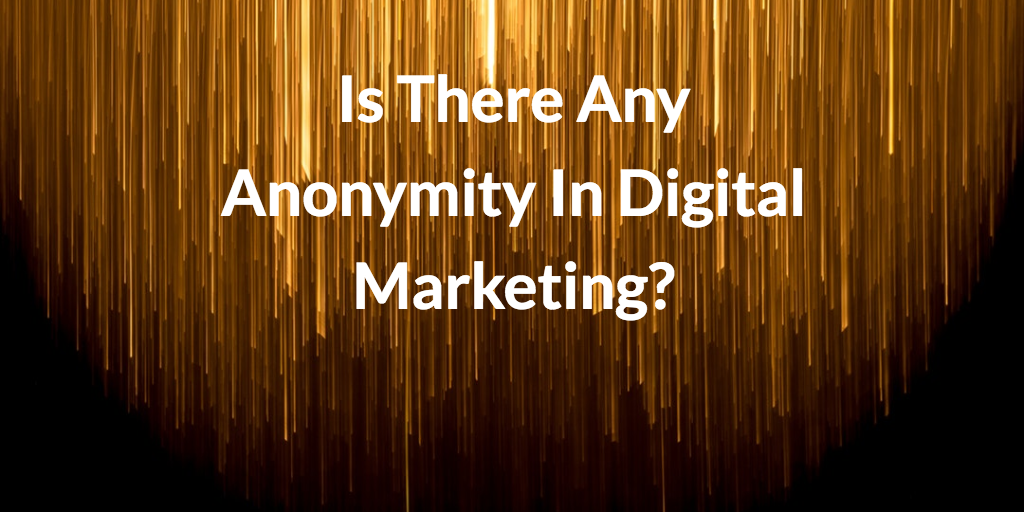Is There Any Anonymity In Digital Marketing?

In the wake of the recent news about the National Security Agency (NSA) and its potential abuses of user data across the country, it may seem today that there is no hiding of information once it’s posted online.
This was precisely my thought when I read Sarah Childress’ article from Frontline; The Future of Digital Marketing Is You. The article focuses on the amazing amount of information that users post online that marketers can take advantage of.
Consider the following numbers:
- Every minute, the world’s 2 billion Internet users upload staggering volumes of data to the web. An estimated 200 billion emails, 48 hours of YouTube videos, 684,478 posts on Facebook. And then there’s Tweets, Instagram photos, text messages and blog posts
Childress goes on to say that marketers are looking at all of this data very closely. What a user posts says a lot about their preferences for certain products and services.
 Today, companies reach consumers with targeted marketing. This is placing ads based on your web searches, the content of your Gmail messages, or your purchasing history. Every time you log into a site like Amazon, the recommendations you see are based not only on your purchase history and items you’ve viewed, but also an algorithm that factors in the preferences of people with similar buying histories. Companies also use retargeting: blanketing the ad space with images of products you’ve viewed as you move on to browse other sites.
Today, companies reach consumers with targeted marketing. This is placing ads based on your web searches, the content of your Gmail messages, or your purchasing history. Every time you log into a site like Amazon, the recommendations you see are based not only on your purchase history and items you’ve viewed, but also an algorithm that factors in the preferences of people with similar buying histories. Companies also use retargeting: blanketing the ad space with images of products you’ve viewed as you move on to browse other sites.
Data Getting Larger
But as the volumes of data we add to the web keeps multiplying — one estimate projects it will grow 300 times by 2020 — it becomes more difficult for marketers to figure out who to target with which ads and when.
So companies are turning to computer models that analyze these massive pools of information to make inferences about your health, personality traits, and even mood in real time, in order to help them predict, and ultimately influence, your next purchase.
One might think that there is no privacy in digital marketing, but wait. Some people are trying to do just that. Consider the case of Whisper, which is an app designed to maximize sharing and minimize risk; for a broad range of industries in which users can anonymously post messages on just about anything. Whisper and other apps like this were featured in an NPR article The Allure of Anonymous Confessional Apps ‘Secret’ And ‘Whisper by Nishat Kurwa.
Here’s How it Works
Users post simple images, or monochromatic backgrounds, overlaid with text — the “secrets”. The app connects to your phone’s contacts list. It also allows you to see secrets from others in “your circle” who are primary connections, or friends of friends.
And though right now we may be witnessing the use of the app by early adopters; Secret may have hit on an important theme in social networking culture of the moment; said investor Josh Elman at Greylock Partners.
“With social media, we have gotten to a place where everything we say goes to all our friends associated with our faces,” he said. “This means … a lot of people feel pressure to perform or look awesome all the time. It doesn’t always feel real.”
Confessional Platforms
The confessional platforms are enabling people to get real, and express things in the open that they otherwise couldn’t. And while there are fears the apps could encourage bullying, these services also could be good for consumers. Imagine, for instance, if employees of the Rancho Feeding Corp. could have used Secret to hint that more than 8 million pounds of improperly processed meat from diseased cows would be flooding the marketplace.
As we watch these apps evolve, they could free people to share their true feelings of real and substantive change.
“Some abuse this,” he said. “But as long as most don’t — and hopefully the companies get even better at stopping the abuse — these can become really important places of expression especially in marketing.
